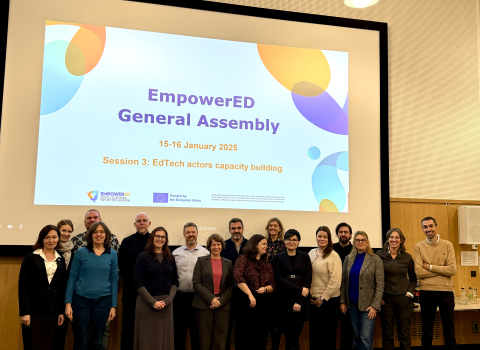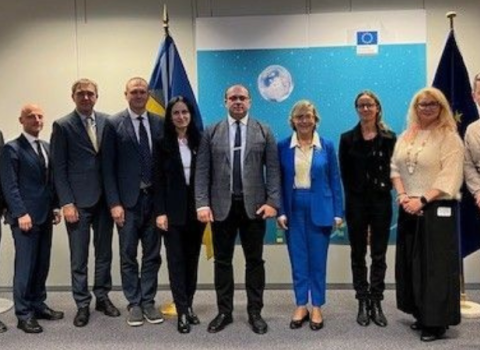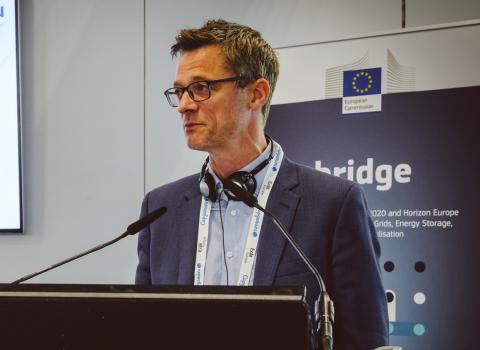After being sent back to the drawing board last year, the budget for the partnership has been cut from a proposed €1.4B - €2B to a miserly €150M. Despite a parallel reduction in its scope, companies say they will struggle to deliver

The final shape of the Horizon R&D partnership aiming to boost EU competitiveness in space is close to being agreed, but the scaled down ambition has disappointed the industry.
“We missed a big opportunity to really change the space industrial settings in Europe,” said Pierre Lionnet, research director at the industry association Eurospace.
The space partnership, involving five industry organisations representing the whole supply chain, was to have been launched in June last year along with other eleven research partnerships. However, long-standing strategic and political interests relating to space got in the way and member states opposed the partnership, pushing the Commission to renegotiate.
This has resulted in a reduction of the scope, with the partnership now limited to the three areas of commercial telecoms, earth observation, and future space ecosystems.
Adding insult to injury, the budget has been drastically reduced, from an initial €1.4 to €2 billion to €150 million for three years.
"We are a bit disappointed. The whole approach reveals itself as quite cumbersome, particularly with regard to the budget expectations," Lionnet said. "There will be way more funding available for activities in Horizon Europe space projects not covered by the partnership than for those under the aegis of the partnership."
The scope of the partnership is now only around one fifth of what was originally proposed. As a result, "some industry players express doubts on the partnership,” said Lionnet. In some cases, "motivation will be very difficult to rebuild."
Similarly, Hans Bracquené, director of the association of small and medium-sized enterprises SMEs4Space, said, “We expected more." Now, he said, "we can only hope” that the partnership will get off the ground. Hopefully, "the interaction with all the stakeholders will lead to a better interaction outside the scope of the partnership itself, that is sufficient to convince the other partners involved - especially member states - that we are good partners for them to discuss with."
Despite the evident disappointment, after years of negotiations, the partnership seems to be finally underway, with a Commission spokesman telling Science|Business the Commission is planning a €1.5 million cooperation and support action 1.5 to provide administrative support.
In addition, the memorandum of understanding is in place and awaiting signing in the first trimester of 2023, and the association composed of the five industry bodies that will oversee the signing of the partnership is almost ready. Its name will be SPACE, (Space Partnership Association for a Competitive Europe).
Projects are likely to start in 2025. After years of negotiations, "The stars are now aligned," said Lionnet.
Mission impossible
With a new budget and smaller scope, partners now need to prepare a new strategic document for the partnership to replace the previous, more ambitious one.
That won't be an easy task, Lionnet said. "The problem will be adapting the previous technological plan to this economic scoping, which is much weaker.”
For instance, the roadmap for commercial telecoms, had an initial budget of €380 million. But now, there is only €50 million to implement the seven activities which are part of it.
"It is impossible to keep all the seven activities worth €380 million, as the partnership would not have the impact that the Commission is expecting, nor the financial leverage," said Lionnet.
"We will need to renegotiate everything, to ask each participant what is the priority, and it will be much more difficult to find the same consensus with €50 million [. . .] It is like when you need to prepare a dinner for many people, but your budget is reduced: you will not be able to do it."
In addition, the procedure is time and resource consuming. "We have already used €270,000 of resources for the initial plan […] This is not peanuts."
With the current budget, "You cannot have full-fledged developments of systems in each domain," said Bracquené. "It's impossible to do. And it should no longer be the ambition of the partnership."
Instead, he said, "Ambitions need to be limited. We must be careful and select the right ones. It will be mostly about niche technologies."
Future partnerships
Even if the partnership doesn't look ideal, some industry players think it could be a forerunner for similar initiatives in the future.
"That should be a model for the future. That's the aim - otherwise, maybe we wouldn't do it,” said Bracquené.
In order to bring forward the partnership, "We will also try to have a different discussion with different actors in the EU. [. . .] We hope that we are able to convince the other partners involved before the end date of the partnership that it can be extended."
But Lionnet is less optimistic. "The impression is that every new partnership is a bit less satisfying than the previous one, and I wonder if it would be possible to think about a future where this partnership could be more interesting, and with an increased budget.”
In addition, the Commission, "Has quite a significant turnover of employees, Lionnet noted. “This would mean it might be hard to have a medium/long terms coherence at the level of the Commission due to changing interlocutors every three years or so."
Giuseppe Aridon, who is involved in strategy and corporate development at the Italian-French multinational Telespazio, a joint venture between Leonardo and Thales, sees the partnership as a forerunner for other partnerships. In future scenarios, he said, there might also be room for other issues, such as defence and security linked to space.
For years, these issues have been a cause of some political tension for the European Commission and the European Space Agency, with defence applications excluded from its statute.
But now, "the importance and relevance of these technologies are clear, and, in the future, they might be included in the research agenda to be covered by future partnerships," Aridon said




 A unique international forum for public research organisations and companies to connect their external engagement with strategic interests around their R&D system.
A unique international forum for public research organisations and companies to connect their external engagement with strategic interests around their R&D system.